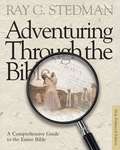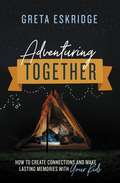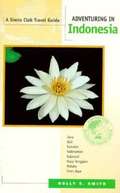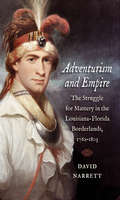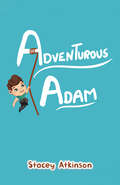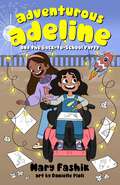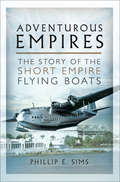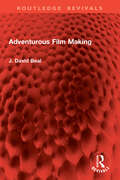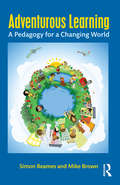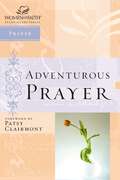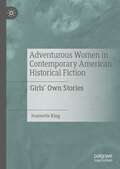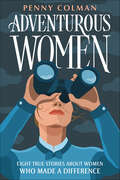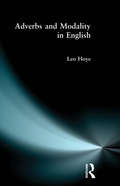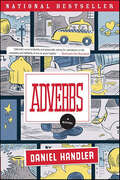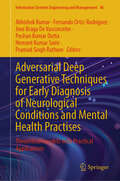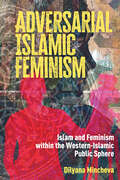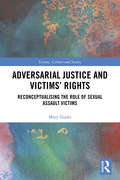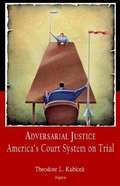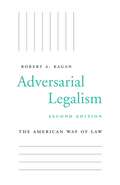- Table View
- List View
Adventuring Through The Bible: A Comprehensive Guide to the Entire Bible
by Ray C. StedmanUnderstanding the Bible can be somewhat intimidating for laypersons. However, the new and improved edition of Adventuring Through the Bible is designed to give readers a thorough overview of the entire Bible in an easy and exciting way. Features more than 1,000 pages filled with outlines, themes, and applications to help the reader grasp the message of each book of the Bible. Provides the reader with a one-stop guide for studying and understanding God's Word.
Adventuring Together: How to Create Connections and Make Lasting Memories with Your Kids
by Greta EskridgeA modern, practical, and inspiring guide to creating deep heart connections with kids by regularly creating new experiences and intentional adventures together.Parents today complain of fragmented relationships with their kids. What parents yearn for--and their kids too--is deep, heart-to-heart connections. But how can parents compete with all the other noise fighting for their kids' attention?The answer, says Greta Eskridge, is to break free from regular routines and familiar comforts of home to experience new places and adventures--even if those adventures go awry. From simply reading a book together to going on an overnight backpacking trip, activities together provide unique and crucial bonding opportunities. Adventuring Together highlights Greta's stories of doing just that, includingan array of ideas for outdoor and indoor ventures,what to do when your finances are limited,and how to adventure if your family can't hit the hiking trail or spend the night at a campground. Giving readers the tools to make adventures happen, Adventuring Together is a step-by-step guide for parents--whether in the city or the country--to start building connections today that will last a lifetime.
Adventuring in Indonesia: Exploring the Natural Areas of the Pacific's Ring of Fire
by Holly S. SmithIn the latest addition to the Sierra Club Adventure Travel series, Holly Smith provides a wealth of savvy and sensitive advice on both outdoor and cultural opportunities in this enormously popular adventure destination.
Adventurism and Empire: The Struggle for Mastery in the Louisiana-Florida Borderlands, 1762-1803
by David NarrettIn this expansive book, David Narrett shows how the United States emerged as a successor empire to Great Britain through rivalry with Spain in the Mississippi Valley and Gulf Coast. As he traces currents of peace and war over four critical decades--from the close of the Seven Years War through the Louisiana Purchase--Narrett sheds new light on individual colonial adventurers and schemers who shaped history through cross-border trade, settlement projects involving slave and free labor, and military incursions into Spanish and Indian territories. Narrett examines the clash of empires and nationalities from the diverse perspectives of Native Americans and of the competing Spanish, French, British, and Anglo-American forces. In a time of great transition, the Louisiana and Florida frontiers were enmeshed in turbulent international politics and experienced tremors from both the American Revolutionary War and the French Revolution. By demonstrating the pervasiveness of intrigue and subterfuge in borderland rivalries and showing that U.S. Manifest Destiny was not a linear or inevitable progression, Narrett redefines the important role these North American borderlands had in shaping the history of the Atlantic world.
Adventurous Adam
by Stacey AtkinsonAdventurous Adam’s own uniqueness is that he wears hearing aids. What is your uniqueness? If you don’t know your uniqueness just yet, you’ll be able to discover it along the way with Adventurous Adam and his friends’ everyday adventures. Adventurous Adam takes you through his everyday life including starting school which can sound scary as it’s something different, but it is not really, it is actually quite exciting meeting new friends and learning new things. Adventurous Adam teaches his friends why he is unique and what it is like to wear hearing aids. Life is for living. The four big influences to take away from this book are: To ACCEPT, to APPRECIATE, be POSITIVE and have EMPATHY for others.
Adventurous Adeline and the Back-to-School Party (Adventurous Adeline)
by Mary FashikIn this first installment of the Adventurous Adeline series, readers will have fun following STEM-enthusiast Adeline and her best friend, Maya, as they seek out solutions for accessibility issues, while also teaching young readers about the importance of making spaces enjoyable for all community members.
Adventurous Eats (Easy Eats)
by Katrina JorgensenLooking for new recipes that will challenge those blossoming cooks? Adventurous Eats will push developing cooks to the next level of kitchen creativity. Try a new flavor combination or a cuisine from across the globe. These recipes are both tasty and tempting!
Adventurous Empires: The Story of the Short Empire Flying Boats
by Phillip E. SimsA milestone in twentieth century aviation is brought to life in this chronicle of the Short Empire, the plane that transformed British global transportation.In 1937, the Short Brothers aerospace company introduced the most successful flying-boat airliner ever built. Designed to a specification for Imperial Airways, then Britain’s national airline, the Short Empire flying-boat carried passengers and, more importantly, mail throughout the British Empire. The airliner offered luxurious travel for the privileged few, every journey being an adventure shared by passengers and crew.Short Brothers built forty-two Empires at their factory in Rochester during the late 1930s. This fleet enabled Imperial Airways to expand their network to the furthermost outposts of the British Empire, whilst laying down the principles of scheduled airline operation. During World War II, the Short Empire was adapted for military use as the iconic Sunderland.Adventurous Empires chronicles how this innovative craft was developed and deployed, turning an aviation dream into reality.
Adventurous Film Making (Routledge Revivals)
by J. David BealAdventurous Film Making (1980) looks at some more ambitious and interesting techniques and shows how these serve film makers in expressing their ideas. This volume spans every kind of film: travel, action, recreations of the past, visual and verbal comedy, the natural world, cartoon and puppet animation, true-life adventures, sporting events, fantasy and science fiction. It focuses on the more advanced use of equipment, and discusses all aspects of shooting and editing, and also reveals for the first time the particular methods chosen by some of the most talented and successful amateur film makers, each an acknowledge specialist in their chosen field.
Adventurous Learning: A Pedagogy for a Changing World
by Mike Brown Simon BeamesAdventurous Learning interrogates the word ‘adventure’ and explores how elements of authenticity, agency, uncertainty and mastery can be incorporated into educational practices. It outlines key elements for a pedagogy of adventurous learning and provides guidelines grounded in accessible theory. Teachers of all kinds can adapt these guidelines for indoor and outdoor teaching in their own culturally specific, place-responsive contexts, without any requirement to learn a new program or buy an educational gimmick. As forces of standardization and regulation continue to pervade educational systems across the globe, both teaching and learning have been starved of creativity, choice and ‘real world’ relevance. Many teachers are keen to improve their practice yet feel constrained by the institutional structures within which they work. By carefully examining adventure and its role in education, teachers can become better able to design and deliver engaging programmes that are underpinned by sound pedagogical principles, and which have deep and enduring meaning for their students.
Adventurous Prayer (Women of Faith Study Guide Series)
by ZondervanThese topical guides will deal with issues that women wrestle with today: God's Will, Living in Christ, Prayer, and Worry. Reaching an audience across race, socio-economic, denominational, and age boundaries, these guides will enhance the lives of women in America as they empower them in their weekly devotions. The study guides can be used for both individual and group settings. Women are asking good questions about their faith. With our study guides, we want to join them in their quest for knowledge and lead them in finding the answers they are seeking.
Adventurous Women in Contemporary American Historical Fiction: Girls' Own Stories
by Jeannette KingThis book brings together for the first time nine groundbreaking historical novels by women from the United States, Canada and Latin America, united by their focus on female adventurers. These novels introduce the neglected women of history, real and imagined, who accompanied their menfolk to the New World, and enabled its settlement or colonisation. Familiar novelists include Isabel Allende, Audrey Thomas and Jane Smiley, but this book also introduces less familiar writers who have produced richly textured and densely historical novels. In addition to putting women back into history, these writers engage with the literature of the past, including the American canon of male fiction which dominated literary history before the intervention of feminist scholars. The book begins with an introduction to the history of historical fiction and provides a theoretical, historical and geographical context for the novels themselves.
Adventurous Women: Eight True Stories About Women Who Made a Difference
by Penny ColmanThe adventures of eight inspiring women of the twentieth century.Mary Gibson Henry risked her life following her passion for new botanical species. During the Civil War, Katharine Wormeley worked aboard hospital ships and helped to save the lives of many sick and wounded soldiers. With a promise and a dollar and a half, Mary McLeod Bethune opened a school for African American girls in Daytona Beach, Florida, in 1904, at a time when schools were segregated. Award-winning author Penny Colman offers a compelling collection of true stories about eight women who were bold enough to confront obstacles and take risks in the pursuit of their goals. This is a book that celebrates the intelligence, fortitude, and courage of women.
Adventurous Women: Eight True Stories About Women Who Made aDifference
by Penny ColmanThe adventures of eight inspiring women of the twentieth century. <P><P> Mary Gibson Henry risked her life following her passion for new botanical species. During the Civil War, Katharine Wormeley worked aboard hospital ships and helped to save the lives of many sick and wounded soldiers. With a promise and a dollar and a half, Mary McLeod Bethune opened a school for African American girls in Daytona Beach, Florida, in 1904, at a time when schools were segregated. <P><P> Award-winning author Penny Colman offers a compelling collection of true stories about eight women who were bold enough to confront obstacles and take risks in the pursuit of their goals. This is a book that celebrates the intelligence, fortitude, and courage of women.
Adverbs (The Magic of Language)
by Ann HeinrichsNo matter if you read quickly or slowly, or whether you start off grumpily or happily, you will surely have a smile on your face once you've learned about adverbs. This book will help young readers identify adverbs and use them in writing and speaking. Adverbs just make reading more fun!
Adverbs and Modality in English (English Language Ser. #No. 21)
by Leo HoyeThis new study on modality in English represents a departure from more traditional approaches to the subject, where the modal auxiliaries have been the usual focus of attention, by examining in detail the nature of their association with different categories of modal adverb. Modality is notoriously complex but the present work offers an accessible introduction to the topic, a comprehensive account of modal-adverb co-occurrence, and a reappraisal of the English modal system. The descriptive framework draws fresh insights from syntactic, semantic and pragmatic approaches to the study of language and communication, and from recent work in corpus linguistics. The book includes contrastive reference to the expression of modality in Spanish and a discussion of modality in such applied contexts as language teaching. A major feature is its reliance on authentic spoken and written language data. The study is suitable for undergraduate and postgraduate students of linguistics, English language, communications studies and related disciplines.
Adverbs: A Novel
by Daniel HandlerHello.I am Daniel Handler, the author of this book. Did you know that authors often write the summaries that appear on their book's dust jacket? You might want to think about that the next time you read something like, "A dazzling page-turner, this novel shows an internationally acclaimed storyteller at the height of his astonishing powers."Adverbs is a novel about love -- a bunch of different people, in and out of different kinds of love. At the start of the novel, Andrea is in love with David -- or maybe it's Joe -- who instead falls in love with Peter in a taxi. At the end of the novel, it's Joe who's in the taxi, falling in love with Andrea, although it might not be Andrea, or in any case it might not be the same Andrea, as Andrea is a very common name. So is Allison, who is married to Adrian in the middle of the novel, although in the middle of the ocean she considers a fling with Keith and also with Steve, whom she meets in an automobile, unless it's not the same Allison who meets the Snow Queen in a casino, or the same Steve who meets Eddie in the middle of the forest. . . . It might sound confusing, but that's love, and as the author -- me -- says, "It is not the nouns. The miracle is the adverbs, the way things are done." This novel is about people trying to find love in the ways it is done before the volcano erupts and the miracle ends. Yes, there's a volcano in the novel. In my opinion a volcano automatically makes a story more interesting.
Adversarial Deep Generative Techniques for Early Diagnosis of Neurological Conditions and Mental Health Practises: Theoretical Insights with Practical Applications (Information Systems Engineering and Management #46)
by Abhishek Kumar Pramod Singh Rathore Fernando Ortiz-Rodriguez Pushan Kumar Dutta Hemant Kumar Saini Jose Braga De VasconcelosThis book explores a pioneering exploration of how deep generative models, including generative adversarial networks (GANs) and variational autoencoders (VAEs), renovating early neurological disorder detection. This book is a bridge between computational neuroscience and clinical neurology gaps, providing novel AI-driven methodologies for diagnosing conditions such as Alzheimer&’s, Parkinson&’s, epilepsy, and neurodevelopmental disorders. With a strong focus on neuroimaging, genomic data analysis, and biomedical informatics, the book equips researchers and practitioners with the tools to improve diagnostic accuracy and decision-making. It includes practical case studies, visual illustrations, and structured methodologies for training and validating deep learning models. Designed for neurologists, radiologists, data scientists, and AI researchers, this book is an essential resource for advancing precision medicine and next-generation healthcare innovation.
Adversarial Deep Learning in Cybersecurity: Attack Taxonomies, Defence Mechanisms, and Learning Theories
by Bo Liu Wei Liu Wanlei Zhou Aneesh Sreevallabh Chivukula Xinghao YangA critical challenge in deep learning is the vulnerability of deep learning networks to security attacks from intelligent cyber adversaries. Even innocuous perturbations to the training data can be used to manipulate the behaviour of deep networks in unintended ways. In this book, we review the latest developments in adversarial attack technologies in computer vision; natural language processing; and cybersecurity with regard to multidimensional, textual and image data, sequence data, and temporal data. In turn, we assess the robustness properties of deep learning networks to produce a taxonomy of adversarial examples that characterises the security of learning systems using game theoretical adversarial deep learning algorithms. The state-of-the-art in adversarial perturbation-based privacy protection mechanisms is also reviewed. We propose new adversary types for game theoretical objectives in non-stationary computational learning environments. Proper quantification of the hypothesis set in the decision problems of our research leads to various functional problems, oracular problems, sampling tasks, and optimization problems. We also address the defence mechanisms currently available for deep learning models deployed in real-world environments. The learning theories used in these defence mechanisms concern data representations, feature manipulations, misclassifications costs, sensitivity landscapes, distributional robustness, and complexity classes of the adversarial deep learning algorithms and their applications. In closing, we propose future research directions in adversarial deep learning applications for resilient learning system design and review formalized learning assumptions concerning the attack surfaces and robustness characteristics of artificial intelligence applications so as to deconstruct the contemporary adversarial deep learning designs. Given its scope, the book will be of interest to Adversarial Machine Learning practitioners and Adversarial Artificial Intelligence researchers whose work involves the design and application of Adversarial Deep Learning.
Adversarial Design
by Carl DisalvoIn Adversarial Design, Carl DiSalvo examines the ways that technology design can provoke and engage the political. He describes a practice, which he terms "adversarial design," that uses the means and forms of design to challenge beliefs, values, and what is taken to be fact. It is not simply applying design to politics--attempting to improve governance for example, by redesigning ballots and polling places; it is implicitly contestational and strives to question conventional approaches to political issues. DiSalvo explores the political qualities and potentials of design by examining a series of projects that span design and art, engineering and computer science, agitprop and consumer products. He views these projects-- which include computational visualizations of networks of power and influence, therapy robots that shape sociability, and everyday objects embedded with microchips that enable users to circumvent surveillance--through the lens of agonism, a political theory that emphasizes contention as foundational to democracy. Each of these projects engages one of three categories as a medium--information, robots, and ubiquitous computing--and in each of them certain distinctive qualities of computation are used for political ends or to bring forth political issues. DiSalvo's illuminating analysis aims to provide design criticism with a new approach for thinking about the relationship between forms of political expression, computation as a medium, and the processes and products of design.
Adversarial Design (Design Thinking, Design Theory)
by Carl DisalvoAn exploration of the political qualities of technology design, as seen in projects that span art, computer science, and consumer products.In Adversarial Design, Carl DiSalvo examines the ways that technology design can provoke and engage the political. He describes a practice, which he terms “adversarial design,” that uses the means and forms of design to challenge beliefs, values, and what is taken to be fact. It is not simply applying design to politics—attempting to improve governance for example, by redesigning ballots and polling places; it is implicitly contestational and strives to question conventional approaches to political issues. DiSalvo explores the political qualities and potentials of design by examining a series of projects that span design and art, engineering and computer science, agitprop and consumer products. He views these projects—which include computational visualizations of networks of power and influence, therapy robots that shape sociability, and everyday objects embedded with microchips that enable users to circumvent surveillance—through the lens of agonism, a political theory that emphasizes contention as foundational to democracy. DiSalvo's illuminating analysis aims to provide design criticism with a new approach for thinking about the relationship between forms of political expression, computation as a medium, and the processes and products of design.
Adversarial Islamic Feminism: Islam and Feminism within the Western-Islamic Public Sphere
by Dilyana MinchevaThis book explores the adversarial world of feminist activism by Muslim women within highly mediated environments (social media, screenwriting, documentary filmmaking, YouTube), focusing on agency, bodily integrity, and familial obligations. It highlights how adversarial Islamic feminism uses social media to spread intersectional feminist messages, creating virtual communities that both support and challenge these ideas. The book showcases the diversity within Islamic practices and the lived experiences of women beyond the gatekeeping authoritative interpretations of Sunni Islamic theology. It presents adversarial Islamic feminism as existing in a borderland between Islam and feminism, questioning and reshaping their confluence. This space allows for a vibrant dialogue that bridges Western and Islamic feminist perspectives, offering a new view on the intersection of these identities.
Adversarial Justice and Victims' Rights: Reconceptualising the Role of Sexual Assault Victims (Victims, Culture and Society)
by Mary IliadisThe rights, status and treatment of sexual assault victims has emerged as a significant 21st-century concern, occupying the forefront of legal commentary on international policy agendas. This book explores the extent to which reforms that offer victims enhanced rights to information and participation across England and Wales, Ireland and South Australia can address sexual assault victims’ procedural and substantive justice concerns. Informed by the voices of 26 high-level criminal justice professionals, legal stakeholders and victim support workers, and a quantitative dataset, this book also considers whether legal representation can address some of the problems of the prosecution process for sexual assault victims in Victoria and, indeed, in other adversarial jurisdictions that employ similar legislative frameworks. While acknowledging the value of victim-focused reforms, this book contends that cultural changes to the ways in which sexual assault victims are perceived and treated are necessary in order to improve victims’ experiences of the legal process. Reconceptualising the role of sexual assault victims from ‘witnesses’ to ‘participants’ will also increase the likelihood that victims’ rights and interests will be considered alongside those of the state and the accused. This book situates its findings within broader debates about the role, rights and treatment of sexual assault victims in adversarial justice systems and outlines prospects for the transfer of policy and practice between jurisdictions. Adversarial Justice and Victims’ Rights will interest academic and policy stakeholders engaged in criminology, law and socio-legal studies, as well as undergraduate and postgraduate students researching sexual violence and victims’ access to justice.
Adversarial Justice: America's Court System on Trial
by Theodore L. KubicekOh, those lawyers! <P><P>The legal profession in fact, the legal system certainly has a poor reputation in the United States. Proposed remedies, however, rarely go as deep as the ethics of the system. America's judicial system should not be a game that anyone can win, regardless of actual guilt or liability. Ted Kubicek, JD, describes the problems and proposes solutions. Above all, he condemns the adversary system of justice which is used to evade the truth and which makes winning the paramount goal. <P><P>Dr. Kubicek postulates that the attorney-client privilege of communication makes the truth more difficult, even impossible, to determine. The adversary system goes hand in hand with the privilege of communication since neither can exist without the other. <P><P>He advocates moving instead to an inquisitorial system, in which truth is the goal of both parties, not just of the party that would gain thereby. He then shows how the elimination of adversaryism would automatically remedy other problems endemic to the system of justice, too, such as the passiveness of trial judges and juries. <P><P>Scrapping the adversary system would abolish trial and pretrial procedures and evidentiary rules that confuse law enforcement and trial participants alike. Criminal verdicts would not then depend upon confusing evidentiary or technical matters having no connection to the guilt or innocence of the accused. <P><P>This book is intended to encourage the legal profession, the judiciary, and the organized bar to remedy America's counter-productive judicial procedures. The argument will also interest anyone who has ever had to go to trial.
Adversarial Legalism: The American Way of Law, Second Edition (California Series In Law, Politics, And Society Ser. #1)
by Robert A. KaganAmerican dispute resolution is more adversarial, compared with systems of other economically advanced countries. Americans more often rely on legal threats and lawsuits. American laws are generally more complicated and prescriptive, adjudication more costly, penalties more severe. Here, Kagan examines the origins and consequences of this system.
